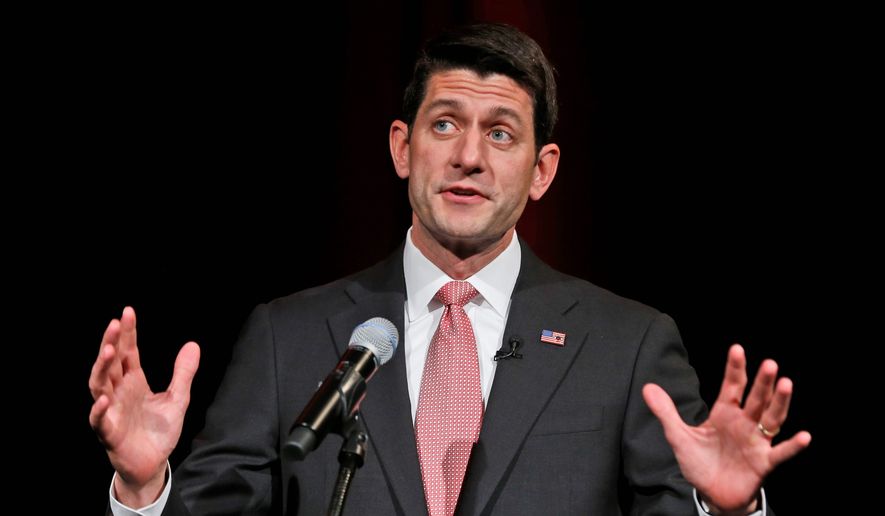As the 2012 GOP vice presidential nominee and a potential candidate near the top of early polling on 2016, Rep. Paul Ryan of Wisconsin would be the theoretical “next in line” for the party to tap for a White House run.
But analysts say that the Wisconsin Republican, whose austere budget proposals have delighted conservatives and infuriated the left over the past several years, might simply be content — for now — to focus on his work in the House.
Mr. Ryan has pledged to use his new post as chairman of the House Committee on Ways and Means to tackle ambitious initiatives ranging from tax reform to welfare policies, and has even started talking in recent months about a possible exit strategy from Congress in the relatively near future.
“He’s immensely appealing as a candidate, and if he runs, his name ID from the last campaign should serve him well,” said GOP strategist John Feehery. “That being said, you can’t win if you don’t run and, in any event, it’s awfully hard to run from the perch of the Ways and Means committee chairmanship.”
Indeed, Mr. Ryan has already charted an ambitious path as the incoming chairman of the powerful committee that has jurisdiction over writing the country’s tax policies.
He told business executives in early December that while the Obama administration would likely hinder any sweeping changes to the country’s tax code, Republicans would work at pursuing any changes they could ahead of possibly retaking the White House in 2016.
He came under fire earlier in 2014 for speaking on a conservative radio show about a “tailspin” of culture, particularly in inner cities, of men not working. But Mr. Ryan, who called the remarks “inarticulate,” has also been actively reaching out to urban communities across the country over the last few years and pitched a sweeping overhaul of the federal welfare system over the summer.
“We need an overhaul of our approach, and this is something that I’m going to spend a lot of my time working on, because I think it’s absolutely essential if we want to reignite the American idea, which is the condition of your birth does not determine the outcome of your life in this country,” he said at the annual Wall Street Journal CEO Council gathering.
He also said he’ll make a decision on a presidential run sometime in 2015.
Polling looks solid for him right now. He regularly places third in surveys of the GOP primary field behind former Florida Gov. Jeb Bush and New Jersey Gov. Chris Christie. And in head-to-head matchups against former Secretary of State Hillary Rodham Clinton, he does better than most other potential Republican nominees.
But John C. McAdams, a political science professor at Marquette University, said that, for the moment, Mr. Ryan is likely content being a conservative policy wonk in Congress rather than risk getting torn apart by possible GOP “fratricide” in the 2016 presidential primary contest.
“Ryan’s comfortably ensconced in the Congress, so he’ll be around for a long time,” Mr. McAdams said. “He’s not old.”
But Mr. Ryan also said recently he doesn’t see himself in Congress in 10 years.
“I want to be an impactful member of Congress. I want to make a big difference,” he told National Journal in a piece that ran shortly after the midterm elections. “But then I want to leave and go do something else. I want to be young enough where I can go do something else with my life.”
He’s still making some of the moves one would associate with laying the groundwork for a potential White House run. His recently released book raised eyebrows for, among other things, criticizing the party’s strategy — spearheaded by hard-line conservatives — that led to the partial shutdown of the federal government in 2013.
He’s also shown the capability for compromise, teaming up with Sen. Patty Murray, Washington Democrat, to craft a short-term budget late in 2013 and pledging to work with her on welfare reform.
One problem for Mr. Ryan’s presidential hopes is a new rule adopted by the House GOP that says committee chairmen must give up their gavels if they decide to run for higher office, including president or governor.
The rule provides for waivers and was not crafted with Mr. Ryan in mind. A spokesman for Mr. Ryan said it wouldn’t affect his decision.
But it does serve as a reminder that one of the intellectual leaders of the party will have a full plate over the next two years, regardless of what he decides.
“My sense is that he is thinking the long game, and probably won’t run this time around,” Mr. Feehery said.
• David Sherfinski can be reached at dsherfinski@washingtontimes.com.




Please read our comment policy before commenting.